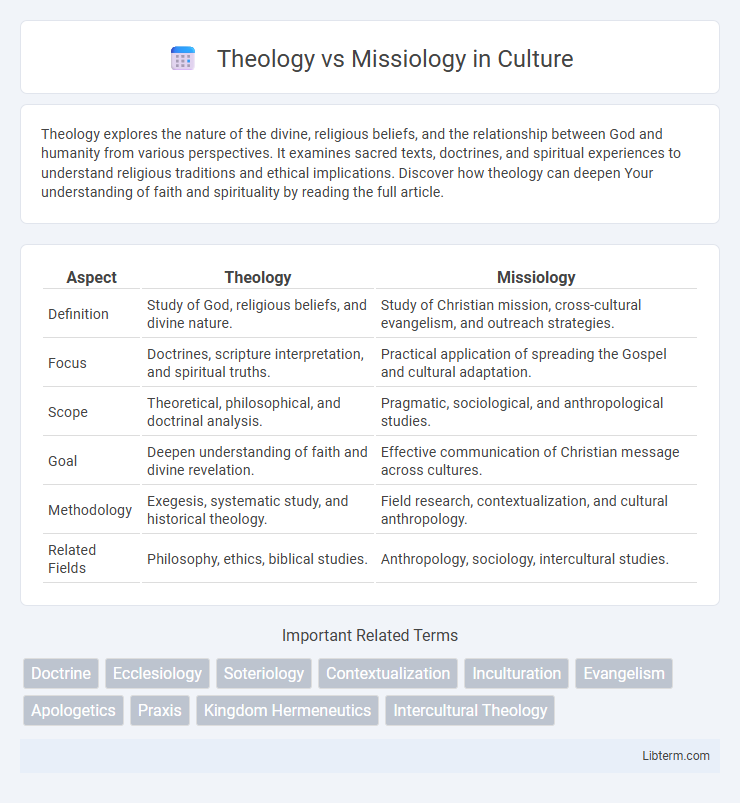Theology explores the nature of the divine, religious beliefs, and the relationship between God and humanity from various perspectives. It examines sacred texts, doctrines, and spiritual experiences to understand religious traditions and ethical implications. Discover how theology can deepen Your understanding of faith and spirituality by reading the full article.
Table of Comparison
| Aspect | Theology | Missiology |
|---|---|---|
| Definition | Study of God, religious beliefs, and divine nature. | Study of Christian mission, cross-cultural evangelism, and outreach strategies. |
| Focus | Doctrines, scripture interpretation, and spiritual truths. | Practical application of spreading the Gospel and cultural adaptation. |
| Scope | Theoretical, philosophical, and doctrinal analysis. | Pragmatic, sociological, and anthropological studies. |
| Goal | Deepen understanding of faith and divine revelation. | Effective communication of Christian message across cultures. |
| Methodology | Exegesis, systematic study, and historical theology. | Field research, contextualization, and cultural anthropology. |
| Related Fields | Philosophy, ethics, biblical studies. | Anthropology, sociology, intercultural studies. |
Defining Theology and Missiology
Theology is the systematic study of the nature of the divine, religious beliefs, and the practice of faith, encompassing doctrines, scripture, and spiritual experience. Missiology specifically examines the mission of the church, focusing on evangelism, cross-cultural ministry, and the methods of spreading the Christian faith globally. Both disciplines interact by interpreting religious truths, but missiology applies these theological principles to real-world contexts of outreach and conversion.
Historical Roots of Theology and Missiology
Theology and missiology share intertwined historical roots, with theology originating from early Christian efforts to understand divine revelation through scripture, tradition, and reason, solidifying through councils and ecclesiastical teachings. Missiology emerged as a distinct discipline in the 19th century, influenced by colonial expansion and global missionary movements seeking to systematically study and strategize Christian evangelism and cross-cultural mission work. Both fields continue to evolve, reflecting shifts in historical contexts, theological frameworks, and intercultural dynamics related to spreading the Christian faith.
Core Objectives: Theology vs Missiology
Theology centers on the systematic study of divine nature, religious beliefs, and spiritual truths, aiming to understand and explain the relationship between God and humanity. Missiology focuses specifically on the strategies, methods, and theological foundations for spreading the Christian faith and engaging in missionary work across diverse cultural contexts. While theology seeks comprehensive doctrinal understanding, missiology prioritizes practical application of those doctrines in evangelism and cross-cultural outreach.
Theological Foundations Shaping Missiology
Theological foundations shaping missiology are rooted in biblical doctrines of God's kingdom, Christ's mission, and the church's role in salvation history. Missiology draws extensively from systematic theology, ecclesiology, and pneumatology to formulate strategies for evangelism and cross-cultural mission work. Understanding the Trinitarian nature of God profoundly influences the approach to missionary activity, emphasizing relationality, incarnation, and redemption.
Missiology’s Impact on Church Practice
Missiology profoundly influences church practice by shaping evangelism strategies, cross-cultural communication, and community engagement, ensuring that mission efforts are contextually relevant and effective. It provides theological frameworks and practical methodologies that guide churches in understanding global mission challenges and adapting worship, discipleship, and outreach programs accordingly. The integration of missiological insights fosters a dynamic, mission-oriented church culture committed to holistic transformation and social justice.
Key Thinkers in Theology and Missiology
Key thinkers in theology include St. Augustine, whose works on doctrine and grace profoundly shaped Christian thought, and Thomas Aquinas, known for integrating Aristotelian philosophy with Christian theology. In missiology, figures like David Bosch stand out for his contributions to understanding the dynamics of mission in the modern context, and Lesslie Newbigin for emphasizing the intercultural and dialogical nature of Christian mission. Both disciplines intersect through thinkers such as John Stott, who combined theological rigor with practical missional insights to influence evangelical thought worldwide.
Comparative Methodologies
Theology employs a systematic and doctrinal approach, emphasizing the study of divine nature, religious beliefs, and scriptural interpretation through hermeneutics and exegesis. Missiology integrates interdisciplinary methodologies, combining theology with anthropology, sociology, and cultural studies to analyze and apply strategies for effective mission work across diverse contexts. Comparative methodologies in these fields highlight theology's foundational doctrinal analysis contrasted with missiology's practical and contextual focus on cultural adaptation and evangelism strategies.
Interdependence and Tensions
Theology and missiology share a dynamic interdependence, where theology provides the doctrinal foundation that shapes missiological strategies and practices focused on evangelism and cultural engagement. Tensions arise as missiology challenges traditional theological assertions by emphasizing contextualization and practical implementation in diverse cultural settings. This interplay fosters a continual dialogue, reshaping theological perspectives through missiological insights while grounding mission efforts in robust theological frameworks.
Global Perspectives and Contemporary Issues
Theology explores the systematic study of religious beliefs and doctrines, emphasizing universal spiritual truths across cultures, while missiology focuses on the practice and strategies of spreading those beliefs within diverse global contexts. Contemporary missiology addresses challenges such as intercultural communication, religious pluralism, and contextualization in mission work, reflecting the complexities of globalization. Global perspectives in theology and missiology increasingly integrate issues like social justice, ecological concerns, and interfaith dialogue to respond to evolving religious landscapes worldwide.
Integrating Theology and Missiology for Mission
Integrating theology and missiology enhances mission effectiveness by grounding outreach strategies in sound biblical doctrine while addressing cultural contexts. This synergy fosters a mission approach that is both theologically informed and practically relevant, enabling churches to engage communities with deeper spiritual insights and contextual sensitivity. Emphasizing the unity of theological principles and missiological methods strengthens global mission initiatives and supports sustainable faith growth.
Theology Infographic

 libterm.com
libterm.com